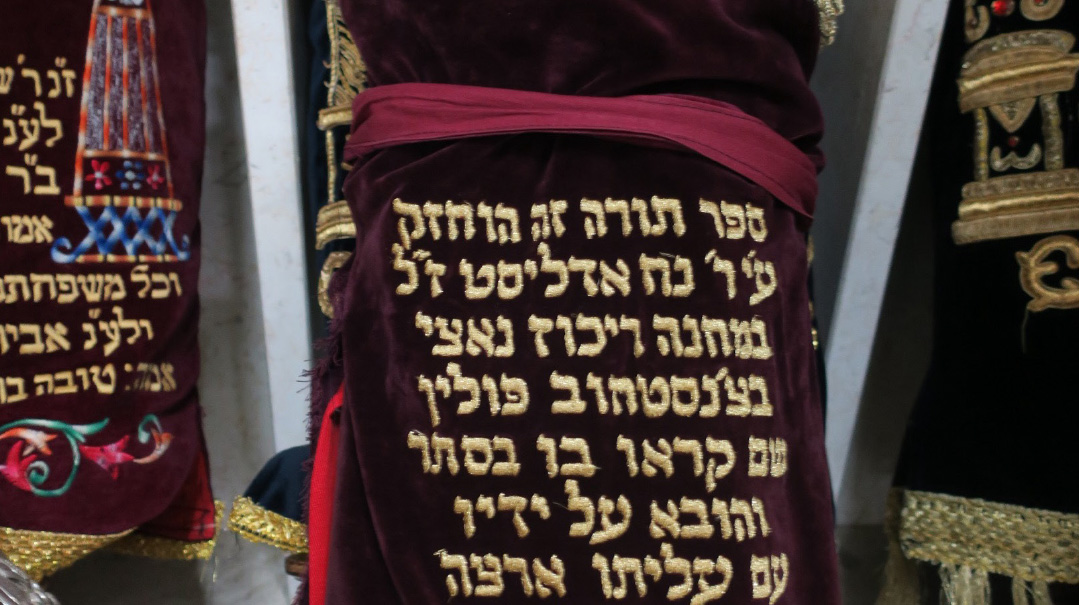Tzniyus and the Preparation for Yom Kippur

“Walking humbly” has nothing to do with a low self-image. Just the opposite
MY Yom Kippur topic this year will not be teshuvah itself, but rather the conditions that make teshuvah possible. What kind of person must one become to do teshuvah, and how does one develop into that person?
First, to be capable of doing teshuvah, one must be able to think deeply about oneself. And that, in turn, requires that one has a self that is not just determined by the opinions of others. And it requires an awareness of Hashem as a constant presence. Before one can begin to repent of the distance that one has placed between himself and Hashem — the Mabit’s definition of teshuvah in his Beis Elokim — one must first develop a consciousness of Hashem and of living one’s life before Him.
Surprisingly, the stimulus for these thoughts comes from a new sefer titled Reclaiming Dignity: A Guide to Tzniut for Men and Women, which has been flying off the shelves since its publication. (That enthusiastic response is itself a reflection of how deeply felt is the need for guidance in this area.) The sefer is divided into two parts. The first is a collection of essays on tzniyus by a broad cross-section of Torah educators compiled by Mrs. Bracha Poliakoff; the second, an extensive halachic and meta-halachic treatment of the topic by Rabbi Anthony Manning, is rooted in a series of shiurim given by Rav Yitzchak Berkovits in his Jerusalem Kollel 20 years ago.
As the subtitle suggests, one of the authors’ principal objectives is to broaden the scope of what we mean when we speak about tzniyus to include far more than dress codes, and to apply that broader context to both men and women. That effort is crucial, Rabbi Manning and a number of the essayists suggest, if we want our wives and daughters to relate to the halachic requirements not as a set of arbitrary, imposed rules, but as means to a deeper relationship with Hashem and a far more spiritually uplifting life.
Rabbi Manning points out that Chazal use the term tznuyim over 100 times, and in only a few instances are they referring to a person’s dress. Rather the term or variants of the root tzadi-nun-ayin refer to a number of interrelated concepts: self-respect, individuality, inner-directness — taking one’s guidance from the dictates of one’s own seichel rather than from the opinions of others; a deep sense of a private realm that is cut off from the gaze of others, in which the only parties are oneself and Hashem; humbleness; the quality of bushah or shame, which Chazal identify as one of the hallmarks of the Jewish People; and a sense of one’s inherent dignity as created in the Divine image.
The best-known Torah verse employing the root mentioned above is the prophet Michah’s enumeration of the three things Hashem seeks from us, concluding, “and walk humbly [v’hatzneia leches] with your G-d” (Michah 6:8). The Radak explains, “This refers to the unity and love of G-d with all one’s heart and all one’s soul. V’hatzneia expresses that such matters are given to the heart, in a private place.” The sole motivation of the one who walks humbly with Hashem is that relationship. The approval or opinions of others means nothing to him.
He (or she) recognizes, as Mrs. Yael Kaisman puts it in one of the essays, that true growth is based on the decisions that one makes where there is no admixture of external accolades, and that decision is unsullied by the taint of any influence other than one’s relationship to Hashem. Rav Gedaliah Schorr once explained the verse, “The hidden things are to Hashem; and the revealed to us and our children” (Devarim 29:28), to mean that as long as our meritorious deeds remain hidden from our fellow man, they “belong to Hashem” — i.e., they stand for our eternal reward. But as soon as they are “revealed” and belong to everyone, they no longer accord the same merit.
The Mishnah (Maaser Sheini 5:1) describes the practice of some elevated souls to redeem the neta revai of their fruit trees during shemittah to ensure that someone who entered their orchards and took from the fruits, without realizing that they could only be eaten in Yerushalayim, would not sin inadvertently. Those who did so are called by the Mishnah “tznuyim.” What they did to protect other Jews from transgressing could not have been known to anyone other than themselves.
“Walking humbly” has nothing to do with a low self-image. Just the opposite. It refers to someone who is so aware of his own individuality that it is impossible for him to look down on someone else, because any comparison to another is for him pointless. One of the reasons that modesty so attracts others is that the genuinely humble person never compares himself to others, but only to the ideal tzuras ha’adam with which he alone was created.
The Chazon Ish, for instance, knew that no one else pushed himself as he did in learning, only getting up off the mattress on the floor on which he would learn at the end of the day, when he had calculated that he would soon have no more strength to make it to his bed. But he did not pride himself in that, and would almost certainly have said that anyone else born with his kochos hanefesh would have learned with even greater hasmadah.
That awareness of falling short of one’s own ideal tzurah or, alternatively, of one’s flaws in the presence of a perfect Creator, constitute the positive bushah (sense of shame) that has always characterized the Jewish People (Nedarim 20a). Both explanations of positive bushah are correct, I think, and that bushah drives the anav to seek ever higher spiritual levels. Awareness of the distance between one’s present state and the ideal drives the teshuvah process.
The hatzneia leches whom we are describing possesses a heightened sense of privacy, an awareness that much of one’s life must remain hidden and not everything must be shared. He is, in that regard, the antithesis of all those on social media for whom there is nothing too trivial to be shared with the world and who define themselves exclusively in terms of others’ approbation — i.e., how many “likes” they receive.
The more one’s thoughts are shared with others, the less power they have to affect us deeply. Even one’s deepest insights and most powerful emotions are dissipated every time we share them with someone else (apart from Torah chiddushim). The Alter of Kelm once wrote to his son-in-law Rabbi Tzvi Hirsch Braude describing a certain feeling he had experienced 22 years earlier and only now felt he had sufficiently internalized to be able to share.
That which is exposed to the outside world loses its power. The intensity of the marital bond, for instance, derives from the fact that husband and wife share a private realm that belongs exclusively to them. A famous chassan teacher once shared with me Rav Aharon Kotler’s pshat on the verse, kol kevudah bas melech penimah (Tehillim 45:14). Rav Aharon pointed out that kavod is a language of revelation. The animating power of the relationship is that which is revealed, but that revelation takes place only in a manner totally hidden from the view of the world and shared only by the partners themselves.
Of course, we are never truly alone; we are always lifnei Hashem. At the very beginning of his glosses on Shulchan Aruch, the Rema quotes a passage from the Rambam’s Moreh Nevuchim, about a person’s need to internalize “that the Great King, the Holy One blessed be He, Whose glory fills the earth, is standing over him and watching his actions — as is stated, ‘Can a man hide in secret places where I will not see him, declares G-d’ (Yirmiyahu 23:24).”
The laws of tzniyus, which are as detailed with respect to the private realm as they are to the public, reinforce that awareness of Hashem’s constant presence. The Gemara in Berachos (62a) cites a baraisa that one can only describe someone as a tzanua if he is tzanua in the bathroom. And similarly, there are detailed laws for the bedroom and how one gets dressed in the morning. (These examples demonstrate, Rabbi Manning argues, how distorted is any teaching of hilchos tzniyus that primarily emphasizes that one should not be a nichshal [stumbling block] for others’ yetzer hara, or suggests that the laws apply primarily to women and not men.)
In sum, the ideal of tzniyus requires us to develop a self-conception based not on the affirmation of others but rather on a recognition of our dignity as bearing the Divine Image of the Creator, Whose presence is ever with us.
I once heard Rav Yosef Elefant of the Mirrer Yeshivah capture this idea based on the verse in Mishlei (11:2), “V’es hatznuim chochmah — with the modest ones comes wisdom.” Wisdom, he said, requires a proper vessel to retain it. And that vessel is a person’s well-developed inner world, a space that is uniquely his. Those are the true tznuyim.
(Originally featured in Mishpacha, Issue 979. Yonoson Rosenblum may be contacted directly at rosenblum@mishpacha.com)
Oops! We could not locate your form.







